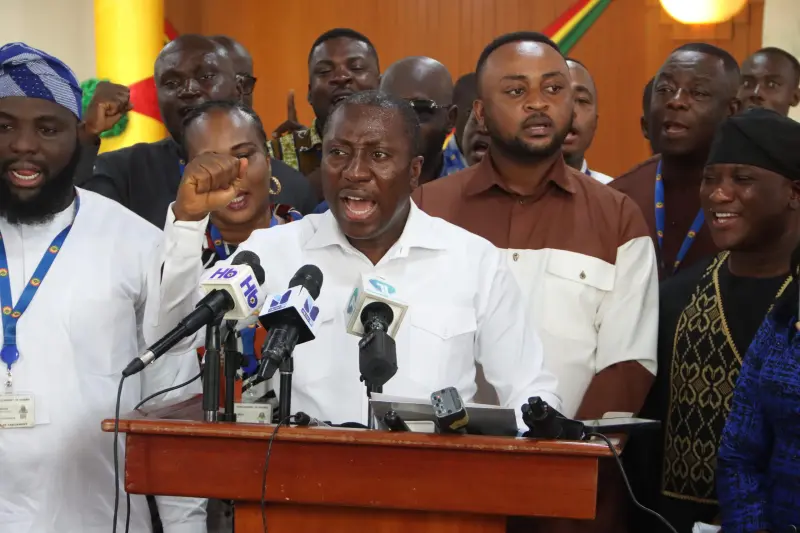The Minority in Parliament has vehemently denounced the Ghana-US deportation arrangement, branding it unconstitutional and demanding its immediate suspension. Their core argument hinges on the government’s implementation of the arrangement without parliamentary ratification, a direct contravention of the 1992 Constitution, which mandates legislative approval for any international agreement that places obligations on Ghana. The Minority underscored this point by referencing prior Supreme Court rulings, particularly the 2016 case concerning the transfer of Guantánamo Bay detainees, which was declared unconstitutional due to the lack of parliamentary endorsement. They argue that this precedent unequivocally establishes the need for parliamentary scrutiny and approval of the current deportation arrangement, regardless of the government’s attempts to categorize it as something less than a formal agreement. Their demand is clear: halt implementation until Parliament has thoroughly debated and ratified the pact.
Beyond the constitutional concerns, the Minority has raised serious alarm over the alleged detention of some deportees against their will in Ghana. These individuals, they assert, have resorted to legal action to safeguard their fundamental human rights, further highlighting the potential for human rights violations under the current arrangement. This has prompted the Minority to demand a comprehensive explanation from the government detailing the safeguards in place to protect the rights of deportees and to ensure the nation’s security. They warn that failing to address these concerns transparently risks undermining Ghana’s international standing and its reputation as a champion of human rights.
The Minority’s criticism extends to the potential impact on Ghana’s foreign policy. They argue that bypassing parliamentary oversight jeopardizes the country’s global image and credibility, particularly its commitment to upholding human rights and pursuing an independent foreign policy. They caution that aligning too closely with US immigration policies risks damaging Ghana’s record of regional solidarity and its neutrality in international affairs. They see this arrangement as potentially compromising Ghana’s ability to act as a mediator in regional conflicts and undermining its standing within the African Union and other international bodies.
Furthermore, the Minority expressed their strong disapproval of recent comments by Foreign Minister Samuel O. Ablakwa concerning the Gaza conflict. They contend that taking a partisan stance in such a complex and sensitive international dispute jeopardizes Ghana’s neutrality and undermines its potential role as a mediator in resolving global conflicts. They emphasize the importance of maintaining a balanced and impartial approach to international affairs, which is crucial for preserving Ghana’s credibility and effectiveness in promoting peace and stability. This principle of neutrality, they argue, is essential for Ghana to play a constructive role in international diplomacy and maintain its reputation as a responsible global actor.
The Minority categorically rejects the government’s assertion that parliamentary approval is only necessary if the deportation arrangement is formally designated as an “agreement.” They argue that this interpretation misrepresents both the spirit and the letter of the Constitution, as well as the clear precedents set by the Supreme Court. The Constitution, they emphasize, makes no such distinction between different types of international arrangements; any arrangement that imposes obligations on Ghana requires parliamentary ratification. The Supreme Court’s rulings, particularly in the Guantánamo Bay case, reinforce this interpretation, leaving no room for the government’s narrow reading of the constitutional requirements.
In conclusion, the Minority remains steadfast in its demand for an immediate suspension of the Ghana-US deportation arrangement. They insist that the government respect the Constitution and uphold the principle of parliamentary oversight by submitting the arrangement for legislative review and ratification. They warn that continuing to implement this arrangement without parliamentary approval not only undermines Ghana’s constitutional framework but also risks damaging its international reputation, jeopardizing human rights, and compromising its foreign policy objectives. The Minority emphasizes that adhering to constitutional processes is paramount and that parliamentary scrutiny is crucial for ensuring transparency, accountability, and the protection of Ghana’s national interests.


